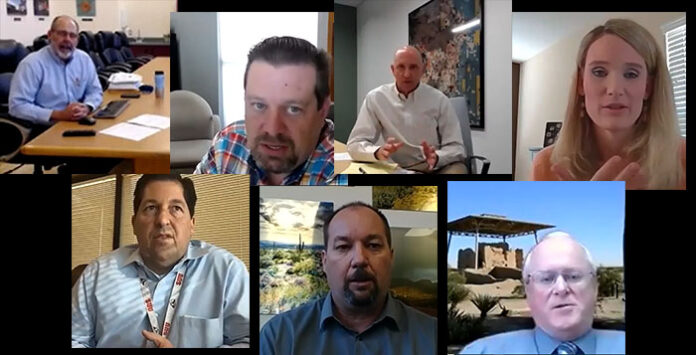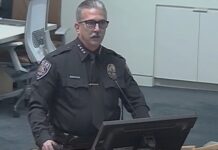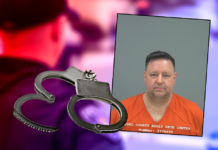The shutdown caused by COVID-19 has “forced” municipal governments and residents to get more tech savvy. It has also sparked innovations.
In a virtual meeting of Pinal Partnership Friday morning, Pinal County’s city managers described how they have approached the pandemic and their plans for the future. Around 225 people “attended” the meeting via Zoom.
Larry Rains, city manager of Casa Grande, and Brent Billingsley of Florence said the necessity of staying ahead of misinformation made both of their staffs become more social-media savvy. Jennifer Brown assistant city manager for the City of Maricopa, said they have also become adept at Zoom and other virtual-meeting platforms.
“All of the city managers, we have been communicating since the onset,” Rains said.
The mayors of Casa Grande and Maricopa have had frequent Facebook Live sessions to communicate with residents.
Harvey Krauss of Eloy said the town had planned to acquire tools for Internet streaming of meetings. “We have been forced to try more technology,” he said.
He credited county programs with helping disseminate information and coordination as community leaders tried to adapt to fast-changing situations.
It felt like we were designing the plane while we were flying,” Krauss said.
“We are more prepared for future incidents like this,” Apache Junction’s Bryant Powell said.
Putting government software like MyGov to use allowed government business to continue remotely for employees and residents.
While towns and cities closed libraries, community centers and recreation programs, municipal business has continued, almost “as usual” while meeting guidelines from the Centers for Disease Control and Prevention.
Brown said there were 315 inspections in one week in Maricopa. Though city employees who can work from home are doing so, each department has at least one person physically at work, she said. Brown noted Maricopans could already conduct much of their City Hall business online, but the City created a curbside service in front of City Hall for those who wanted to come in person.
“There’s been lots of information-sharing between communities,” said Todd Pryor of Superior.
Superior has been delivering meals to senior citizen and making facemasks for about 7% of the population, he said. Powell said Apache Junction, suspended it sign code to allow businesses to have A-frame signs, and Billingsly said Florence waived rents on city property.
Like Maricopa, council in other Pinal municipalities have found ways to hold legal meetings while social distancing. Billingsley said Florence’s mayor is the only one in council chambers for their meetings while the rest of the council attends via Zoom. The meeting is opened an hour early to collect public comment on specific issues and information from the Call to the Public section of the agenda.
Billingsley said Florence has had a different experience with coronavirus because of the prison system in town. One Florence-based prison had 23 inmates with COVID-19. That became a wider concern because the prison is a major employer, and many of those who work in the prison live in Florence.
Some communities, like Superior, have created a task force to help the government and community prepare for eventual reopening. Some of that might include the continuation of programs that came into being because of social-distancing requirements.
Brown said Maricopa initially had a curbside service at the library at the beginning of the pandemic response. That ended after Gov. Doug Ducey’s “Stay Home” order, but Brown said the service might return when things return to normal. There has also been video programming that may continue. MaricopaEats.com, started by City Hall to boost business for local restaurants during the pandemic, has seen 6,400 click-throughs, Brown said, and may have a place in the future.
Pryor said Superior’s meal delivery program may continue in some fashion.
During the meeting, several attendees “chatted” about the challenge of broadband in rural communities. The Zoom feed from Coolidge as Rick Miller talked about his town stuttered frequently as if to stir the conversation on bandwidth.
Friday’s meeting had been scheduled as a discussion about development but was changed due to COVID-19’s impact.
To continue to grow our local coverage of COVID-19’s impact on Maricopa in the difficult weeks to come while continuing our day-to-day newsgathering, we are partnering with the Local Media Association’s foundation to ask our readers to help with a tax-deductible donation at GiveButter.com/inmaricopa.





![Elena Trails releases home renderings An image of one of 56 elevation renderings submitted to Maricopa's planning department for the Elena Trails subdivison. The developer plans to construct 14 different floor plans, with four elevation styles per plan. [City of Maricopa]](https://www.inmaricopa.com/wp-content/uploads/2024/04/city-041724-elena-trails-rendering-218x150.jpg)

![Affordable apartments planned near ‘Restaurant Row’ A blue square highlights the area of the proposed affordable housing development and "Restaurant Row" sitting south of city hall and the Maricopa Police Department. Preliminary architectural drawings were not yet available. [City of Maricopa]](https://www.inmaricopa.com/wp-content/uploads/2024/04/041724-affordable-housing-project-restaurant-row-218x150.jpg)










![Elena Trails releases home renderings An image of one of 56 elevation renderings submitted to Maricopa's planning department for the Elena Trails subdivison. The developer plans to construct 14 different floor plans, with four elevation styles per plan. [City of Maricopa]](https://www.inmaricopa.com/wp-content/uploads/2024/04/city-041724-elena-trails-rendering-100x70.jpg)